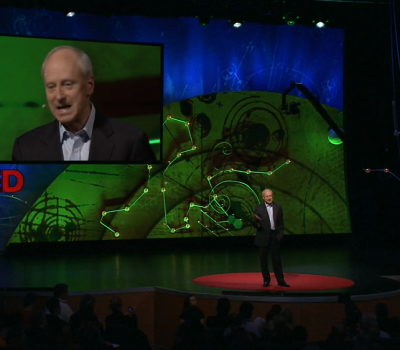ハーバード大学教授で企業倫理の第一人者のマイケル・サンデル(Michael Sandel)のTEDスピーチの英語を徹底解説する。日本語訳なしでも理解できるよう、単語と文法をわかりやすくご説明する。日本語訳ではわからない、マイケル・サンデルの本当のメッセージを感じて欲しい。
スピーチの題名は「Why we shouldn’t trust markets with our civic life」(なぜ市場に市民生活を託すべきではないのか)(2013年6月収録)だ。マイケルは、子どもの教育などを例に、市場経済が現代社会に及ぼしている影響について語っています。お子様をお持ちのビジネスパーソンの方におすすめだ。
なお、TED Talk でのオリジナルスピーチの画像は「Why we shouldn’t trust markets with our civic life」で楽しんでほしい。
なお、このスピーチはトータルで15分ある。全て一つのコラムにアップすると重くなるので3つのコラムに分けた。このコラムは3つ目だ。1つ目は「マイケル・サンデルの英語❶|市場社会の問題とは!TEDを解説」で楽しんで頂きたい。
Now, what this, even this brief debate, brings out is something that many economists overlook. Economists often assume that markets are inert, that they do not touch or taint the goods they exchange. Market exchange, they assume, doesn’t change the meaning or value of the goods being exchanged. This may be true enough if we’re talking about material goods. If you sell me a flat screen television or give me one as a gift, it will be the same good. It will work the same either way. But the same may not be true if we’re talking about nonmaterial goods and social practices such as teaching and learning or engaging together in civic life. In those domains, bringing market mechanisms and cash incentives may undermine or crowd out nonmarket values and attitudes worth caring about.
bring out: 明らかにする、浮き彫りにする
what this (, even this brief debate,) brings out: カッコ内は挿入語で「この短い議論さえ」の意。最初の “this” は、今までの議論のこと。 “what” は先行詞を含む関係代名詞で “the thing which” に置き換えられる。「これが明らかにすること」の意。
something: ここでは「重要なこと」のニュアンス。
overlook /òuvərlúk/ (動) 見落とす
something that many economists overlook: “that” は関係代名詞で先行詞は “something” 「“many economists” が “overlook” している重要なこと」の意。
inert /inə́ːrt/ (形) 不活発な
taint /téint/ (動) 傷つける
Economists often assume that markets are inert, (and) that they do not 〜: カッコ内が省略されており、2つの “that” が並列。 “they” は “economists” のこと。
the goods they exchange: “the goods” の後に関係代名詞 “that” が省略されている。「彼ら(economists)が交換(取引)している “goods”」の意。
Market exchange: 市場での交換(取引)
they assume: 挿入語。カッコに入れると理解しやすい。
the meaning or value of the goods (which is) being exchanged: カッコ内が省略されている。「交換(取引)されている商品の意味(重要性)や価値」の意。
material goods: 有形財 ⇔ nonmaterial goods: 無形財
sell me a flat screen television: 「フラットスクリーンテレビを私に売る」
give me one as a gift: “one” は「フラットスクリーンテレビ」のこと。「それをギフトとして私にくれる」
It will work the same either way: “the same” は副詞的に “work” を修飾しており「同様に」の意(“in the same way” の省略形とも考えられる)。 “either way” は「(売る・くれる)どちらの方法でも」の意。全体では「それは、どちらの方法でも同様に機能する」の意。
the same may not be true if 〜: 上記の “the same” のこと。「〜ならば、「同様に」というところは事実ではないかもしれない。」の意。
social practice: 社会的慣習
engaging together in civic life: 「一緒に市民生活に関与する」の意。
domain /douméin/ (名) 領域
undermine /ʌ̀ndərmáin/ (動) 台無しにする
nonmarket value: 非市場的価値
Once we see that markets and commerce, when extended beyond the material domain, can change the character of the goods themselves, can change the meaning of the social practices, as in the example of teaching and learning, we have to ask where markets belong and where they don’t, where they may actually undermine values and attitudes worth caring about. But to have this debate, we have to do something we’re not very good at, and that is to reason together in public about the value and the meaning of the social practices we prize, from our bodies to family life to personal relations to health to teaching and learning to civic life.
see: ここでは「理解する」のニュアンス。
commerce /kɑ́mərs/ (名) 商取引
when (markets and commerce are) extended beyond the material domain: カッコ内が省略されている。「“markets and commerce” が “material domain” を超えて拡大適用された場合」のニュアンス。全体が挿入語。全体をカッコに入れると理解しやすい。
markets and commerce can change 〜, (and) can change 〜,: 一つ目の “can” と二つめの “can” が並列。
as in the example of teaching and learning: ここまでが、接続詞 “Once” から始まる従属節。「“teaching and learning” の例にあるように」の意。
we have to ask where markets belong and where they don’t, where they may actually undermine values and attitudes worth caring about: この文が主節。3つの “where” は疑問詞。3つ並列と考えても良い。関節疑問のため “where” の後は平叙文の語順。「どこに〜、そしてどこに〜、どこに〜ということを我々は問わなければならない」の意。
we have to do something we’re not very good at, and that is 〜: “something” の後に関係代名詞が省略されている。先行詞は “something” で「我々があまり得意ではないことをしなければならない」の意。次の “that” は “something” を示す。
reason /ríːzn/ (動) ここでは「(論理的に考えて~だと)論じる、結論を下す」の意。 ⇨ “reason together in public about 〜”「〜について公に共に論じる」の意。
prize /práiz/ (動) 尊重する
from our bodies to family life to personal relations to health to teaching and learning to civic life: 全て “social practices” の例としてあげている。 “from 〜 to …” で、5つの “to” が全て並列。
Now these are controversial questions, and so we tend to shrink from them. In fact, during the past three decades, when market reasoning and market thinking have gathered force and gained prestige, our public discourse during this time has become hollowed out, empty of larger moral meaning. For fear of disagreement, we shrink from these questions. But once we see that markets change the character of goods, we have to debate among ourselves these bigger questions about how to value goods.
Now these are 〜: “these” は 前文の “the value and the meaning of the social practices we prize” のこと。
shrink /ʃríŋk/ (動) 尻込みする ⇨ “shrink from them”「“them” から後ずさりする」の意。“them” は “controversial questions” を指す。
reasoning /ríːzəniŋ/ (名) 論法
prestige /prestíːʒ/ (名) 名声
discourse /dískɔːrs/ (名) 会話 ⇨ “public discourse”「公の議論」の意。
hollow /hɑ́lou/ (動) ~をくりぬく ⇨ “hollow out”「空洞化させる」の意。
moral meaning: ここでは「道徳上の重要性」のニュアンス。
For fear of disagreement: 意見が相違することへの恐れから
One of the most corrosive effects of putting a price on everything is on commonality, the sense that we are all in it together. Against the background of rising inequality, marketizing every aspect of life leads to a condition where those who are affluent and those who are of modest means increasingly live separate lives. We live and work and shop and play in different places. Our children go to different schools.
corrosive /kəróusiv/ (形) 腐食性の
One of the most corrosive effects of putting a price on everything: ここまでが主語。「すべてのものに価格をつけることの最も腐食性のある効果」の意。
commonality /kɑ̀mənǽləti/ (名) 共通性 ⇨ “〜 is on commonality”「〜は共通性への影響にある」の意。 “on” は “the most corrosive effects (on 〜)” の “on” と考えることができる。
we are all in it together: 全員参加 ⇨ “the sense that we are all in it together”「全員が参加するという感覚」のニュアンス。
marketize /mɑ́ːrkitɑ̀iz/ (動) ~を経済化する ⇨ “marketizing every aspect of life” ここまでが主語で「人生の全ての側面を経済化すること」の意。
a condition where 〜: “where” は関係副詞で「〜なところの “condition”」の意。 “condition” はここでは「状況」の意。
affluent /ǽfluənt/ (形) 裕福な
modest /mɑ́dəst/ (形) 質素な ⇨ “be of modest”: 「質素な性質がある」のニュアンス。 “be of + 形容詞” で「〜な性質がある」の意。
live a 形容詞 + life: 〜な人生を送る
those who are affluent and those who are of modest (means) increasingly live separate lives: 2つの “those who 〜” は「〜な人たち」の意。かっこ内を飛ばして読むと理解しやすい。
This isn’t good for democracy, nor is it a satisfying way to live, even for those of us who can afford to buy our way to the head of the line. Here’s why. Democracy does not require perfect equality, but what it does require is that citizens share in a common life. What matters is that people of different social backgrounds and different walks of life encounter one another, bump up against one another in the ordinary course of life, because this is what teaches us to negotiate and to abide our differences. And this is how we come to care for the common good.
This isn’t 〜: “This” は「富めるものとそうでないものが別々に生活すること」と示す。
nor /nɔːr/ (接) 〜も~でない ⇨ “nor is it a satisfying way 〜”: 否定詞 “nor” が文頭に来て “is it” と倒置が起きている。 “and it is not a satisfying way 〜” と同じ意味。
satisfying /sǽtisfàiiŋ/ (形) 満足感を与える
even for those of us who 〜: “who” は関係代名詞で先行詞は “those of us”。 全体では「〜である我々の様な人たちにとってさえ」の意。
can afford to 〜: ~する能力[金銭的余裕]がある
buy our way to the head of the line: 「列の最初への道を買う」つまり「列に並んでくれる人にお金を払う」のニュアンス。
what it does require: “what” は先行詞を含む関係代名詞で “the thing which” に置き換えられる。「〜のこと/もの」の意。 “does” は強調。全体では「それ(democracy)が要求すること/もの」の意。
share in a common life: 「日常の生活でシェアする」から「日常生活を共有する」のニュアンス。
What matters is that 〜: “what” は先行詞を含む関係代名詞で “the thing which” に置き換えられる。「重要なことは “that以下”」の意。
(people of) different walks of life: さまざまな職業・地位(の人々)
encounter /enkáuntər/ (動) 〔偶然〕出合う
one another: お互い
bump up against 〜: ~にぶつかる
ordinary course of life: 通常の人生
this is what teaches us to 〜: “this” は「様々な人が日常生活で偶然出会うこと」を意味する。“what” は先行詞を含む関係代名詞で “the thing which” に置き換えられる。全体では「〜することを我々に教えてくれるもの/こと」の意。
abide /əbáid/ (動) 甘受する
how we 〜: “how” は先行詞を含む関係副詞で「〜する方法」の意。
come to care for 〜: “come to 〜” は「〜になる」のニュアンス。“care for 〜” は「〜を大事に思う」のニュアンス。
common good: 共通の利益
And so, in the end, the question of markets is not mainly an economic question. It’s really a question of how we want to live together. Do we want a society where everything is up for sale, or are there certain moral and civic goods that markets do not honor and money cannot buy? Thank you very much.
the question of 〜: 〜の問題
economic question: 経済問題
a question of how we want to 〜: “how” は疑問詞で「どのように〜するか」の意。ここでは間接疑問のため “how” 以下は平叙文の語順。全体では「我々がどのように〜したいのかの問題」の意。
a society where everything is 〜: “where” は関係副詞で先行詞は “society”。「全てが〜なところの “society”」の意。
civic goods: 公共財
honor /ɑ́nər/ (動) 引き受ける
certain moral and civic goods that markets do not 〜: “that” は関係代名詞で先行詞は “certain moral and civic goods”。「市場が〜しない、あるモラルや公共財」の意。

『英語独学完全マニュアル』
独学で効率的に習得する科学的学習法の全て(全79ページ)
英語は独学が基本です。しかし、「自分の学習方法が正しいかどうか…」不安に思っていませんか?本書は、英語の学習方法についてお悩みの皆さまに、第二言語習得研究と脳科学(神経科学)研究の知見に基づいた真に効率的な英語学習法をご紹介する解説書です。
無料eBookの主な内容
- 単語・文法・発音の効率的な基礎力強化方法
- インプット(読む・聞く)能力向上のための英語脳作りトレーニング法
- アウトプット(話す・書く)能力向上のためのリハーサル・トレーニング法
- 学習計画の立て方と効率性を上げるための学習習慣
そろそろ本気で英語を習得したいとお考えの方におすすめです。また、「英会話スクールに通っているけど思うように上達しない…」「TOEICで高得点を取ったけど話せない…」などでお悩みの皆さまも是非ご一読ください。



